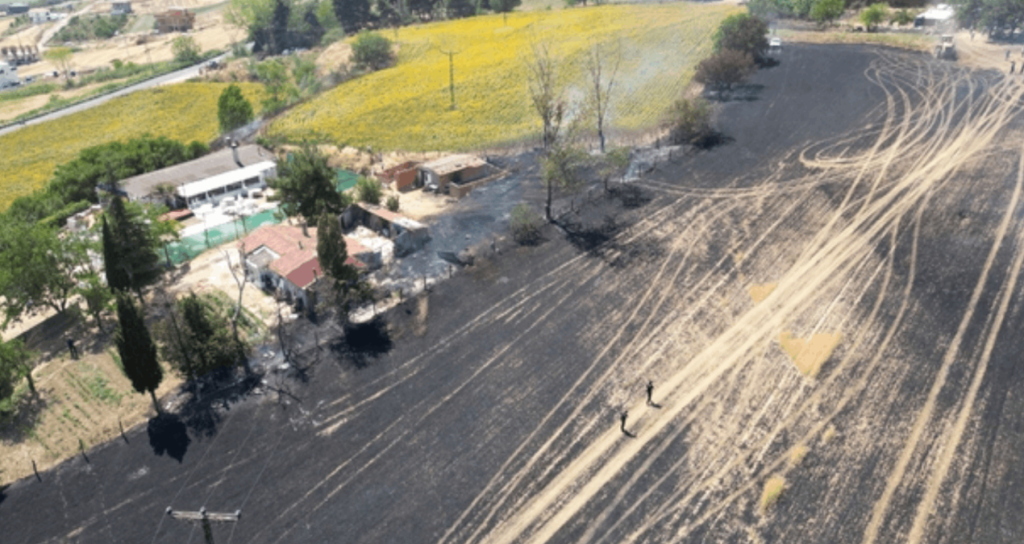As the agricultural harvest season unfolds, several regions have been affected by fires in cultivated fields, with significant damage reported. Teams in Edirne, Kırklareli, and Tekirdağ have extinguished fires over a total of approximately 2,750 decares of land, with local officials emphasizing the need for increased fire safety measures as temperatures rise. Various stakeholders within the agricultural community are working swiftly to assess damage and protect remaining crops during this crucial time.
| Article Subheadings |
|---|
| 1) Overview of Fires in Agricultural Fields |
| 2) Immediate Impact on Farmers and Local Produce |
| 3) Official Responses and Precautionary Measures |
| 4) Community Safety Initiatives |
| 5) Future Predictions and Precautions |
Overview of Fires in Agricultural Fields
Since the beginning of the harvest season, uncontrolled fires have ravaged cultivated fields across multiple provinces in the region. Reports indicate that the fires have affected approximately 2,750 decares of land, with Edirne experiencing 650 decares impacted, Kırklareli 700 decares, and Tekirdağ around 1,400 decares. This alarming situation has incited concerns among agricultural officials regarding the potential long-term effects on local crop production. Fires are often attributed to various factors, including negligence and environmental conditions, with recent climate trends exacerbating the risks of such incidents.
Immediate Impact on Farmers and Local Produce
The agricultural community is facing a daunting challenge as fires have destroyed significant portions of wheat and barley cultivations. In Edirne alone, authorities confirmed that 650 decares of wheat fields were engulfed, leading to substantial crop loss. Atilla Bayazit, the provincial director of agriculture and forestry in Edirne, lamented that these incidents could drastically undermine agricultural production and the livelihoods of farmers. Meanwhile, in Kırklareli, Gökhan Karaca, the provincial director, highlighted that as barley harvesting nears completion and wheat harvests progress, the ongoing fires pose a critical threat to farmers’ hard work throughout the year.
Official Responses and Precautionary Measures
In response to the crisis, local government officials have launched damage assessment initiatives to evaluate the extent of losses across various districts and villages. Both Bayazit and Karaca have called for heightened vigilance and precautionary measures among farmers, urging them to be proactive in preventing fires during the harvesting processes. An emphasis has been placed on the necessity of having water tankers readily available to swiftly combat potential fires. Furthermore, local regulatory bodies have updated guidelines on fire prevention, warning farmers against common fire hazards such as the improper disposal of cigarette butts and other flammable materials.
Community Safety Initiatives
The local community has also stepped in to mitigate the risks associated with agricultural fires. Imdat Saygi, president of the Tekirdağ Chamber of Agriculture, has encouraged farmers to exercise extreme caution and report any suspicious activities that could lead to fires. To reinforce safety measures, farmers have been reminded to keep water tanks handy and eliminate any potential fire hazards during the ongoing harvest season. Additionally, there are pleas to avoid setting off fireworks during weddings and celebrations, which are common sources of fire outbreaks.
Future Predictions and Precautions
Looking ahead, experts warn that rising temperatures, as indicated by statements from the General Directorate of Meteorology, will likely heighten the risk of further fires. Karaca highlighted that precautionary measures are imperative for safeguarding crops that farmers have toiled over for an entire year. By implementing stricter controls and educating community members on fire safety, authorities aim to prevent additional disasters that could decimate agricultural output.
| No. | Key Points |
|---|---|
| 1 | Fires have affected 2,750 decares of land across Edirne, Kırklareli, and Tekirdağ. |
| 2 | Immediate impact includes loss of wheat and barley crops, jeopardizing farmer livelihoods. |
| 3 | Officials are conducting damage assessments and encouraging enhanced fire safety measures. |
| 4 | Community initiatives focus on educating farmers and reducing fire risks during the harvest season. |
| 5 | Predictions point to increased fire risk due to rising temperatures, demanding ongoing precautionary actions. |
Summary
The ongoing crises regarding agricultural fires in Edirne, Kırklareli, and Tekirdağ not only threaten the yield of vital crops but also highlight the critical need for improved fire safety measures and community awareness. The regional agricultural community is coming together to address these challenges proactively, ensuring long-term sustainability and safety in farming practices.
Frequently Asked Questions
Question: What were the primary reasons for the fires in agricultural fields?
The primary reasons for the fires include negligence, rising temperatures, and environmental factors that exacerbate fire risks during the harvest season.
Question: What measures are being implemented to prevent further fires?
Local officials are conducting damage assessments, urging farmers to maintain water tanks on hand, and enforcing stricter guidelines to minimize potential fire hazards.
Question: How are authorities informing farmers and the community about fire safety?
Authorities are conducting community education initiatives, offering information sessions on fire prevention, and collaborating with local organizations to spread awareness about safe farming practices.


